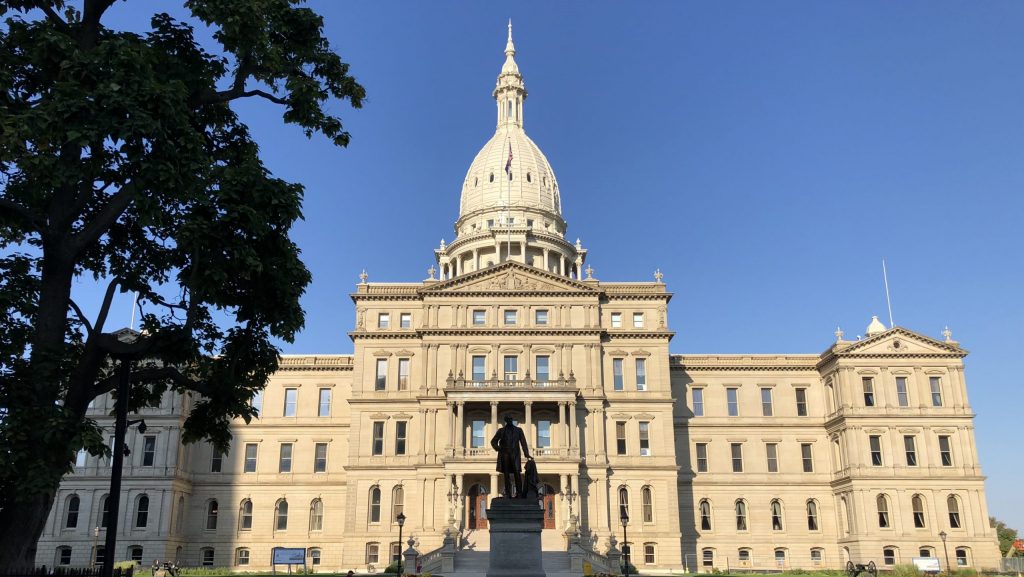MichMash: Lansing’s Dreams Meet Reality In Slew of Quick Fix Laws
Auto insurance and vaping laws show delicate balance between getting it right the first time and “not letting perfect be the enemy of the good.”

Michigan State Capitol building.

New leaders at the state Capitol are successfully tackling issues that have eluded lawmakers and governors for years.
Gov. Gretchen Whitmer has signed new laws meant to address Michigan’s highest-in-the-nation auto insurance rates and that restrict vaping products for minors. But for some, these imperfect compromises just create issues down the line.
“I feel like actually half the work we do in the Legislature is fixing bills we voted on the previous” session, said state House Speaker Lee Chatfield (R-Levering) during the legislative panel discussion on Mackinac Island last month.
“I mean, you’re constantly doing trailer bills, you’re doing fixes to what you addressed last term,” he continued.
But it isn’t just political expediency pushing lawmakers to make compromises. Term limits and other factors complicate how both parties approach these issues. As part of the weekly series MichMash, Cheyna Roth and Jake Neher explain these bills became law with the understanding that they would need to be fixed in the future.
Click on the audio player above to listen to MishMash, and see examples of “quick fix” laws below.
Auto insurance overhaul gets immediate fix
Before the ink had even dried on Gov. Whitmer’s signature, the landmark legislation to overhaul Michigan’s auto insurance system needed to be fixed.
Less than a week after the bill became law, lawmakers passed an amendment that would prevent a one-year spike in auto insurance costs caused by a provision in the new law. But beyond those “technical fix” bills, legislative leaders all seem to agree that they need to make more substantive changes to the law.
“There were four goals in my mind that we were trying to achieve” on the auto insurance package, said Senate Majority Leader Mike Shirkey (R-Clarklake) during a panel discussion at the 2019 Mackinac Policy Conference. “I think we hit a home run on three of the four, and the fourth one, we’ve got a little more work to do.”
Shirkey did not specify what that fourth goal is, but it was clear that he and other lawmakers want to revisit auto insurance soon. Many Democrats say they want to go back and make sure more is done to prevent insurance companies from setting rates based on non-driving factors, including “territorial ratings,” which allow insurers to set prices based on where a person lives.
“I don’t think there’s anything like a perfect bill,” said state Sen. Adam Hollier (D-Detroit), who voted in favor of the auto insurance package despite concerns about discriminatory price-setting. “But I think it’s much better than anything that we’ve been talking about.
“But most importantly, it’s the beginning for a broader discussion about what we can do to really take care of folks,” Hollier continues. “So, we passed one bill and the governor signed it last week. And we’ve already started to fix it and make this legislation better. And I hope that we continue to do that.”
Whitmer signs legislation to regulate vaping despite “significant reservations”
Gov. Whitmer was in a tough spot when the Legislature recently sent her bills that would ban sales of vaping products — including e-cigarettes — to minors. She had previously voted in favor of similar legislation as a State Senator. But her own health department publicly testified against these bills, saying vaping products should be part of the more-comprehensive laws regulating tobacco products.
In an earlier edition of MichMash, Roth and Neher talked about Whitmer’s dilemma on this issue.
In a statement announcing she had signed the legislation, Whitmer’s office said: “Governor Whitmer criticized the legislation for not going far enough to protect Michigan’s kids from nicotine addiction, calling it ‘a mistake’ to separate e-cigarettes from the Youth Tobacco Act’s definition of ‘tobacco products.’”
The governor didn’t explicitly call for the Legislature to take up more bills on the matter, but she’s clearly unhappy with the way Michigan will regulate these products.
Michigan’s new wrongful conviction fund goes unfunded
People who were found to be wrongfully convicted in Michigan are now entitled to compensation for their time in prison under the 2016 Michigan Wrongful Imprisonment Compensation Act.
One problem: There’s no money in that fund.
Lawmakers did not establish a continuous funding source for the fund when they approved the bill. That has created all kinds of tension during this term.
Gov. Whitmer actually used a line-item veto to block lawmaker’s attempt to put $10 million in that fund this year. She cited her promise to veto any policy bill that also appropriates money. That’s a tactic Republican leaders have used often in recent years that makes controversial laws immune from ballot measure that would overturn them by a vote of the people. Whitmer said lawmakers should put money into the fund by going through the normal budget process.
Quick fixes a result of term limits
Many lawmakers espouse the political cliché, “Don’t let the perfect be the enemy of the good.” But with the constant turnover in the state Legislature, the concern is that many new lawmakers are unfamiliar the way those compromises have been made and the unresolved issues in existing law. This makes it more difficult to address those issues later.
A recent surprise announcement from Senate Majority Leader Mike Shirkey even outlined plans to pursue ending term limits in Michigan in the coming years.
So, for those who oppose them, term limits are just another imperfect law in need to a fix.
